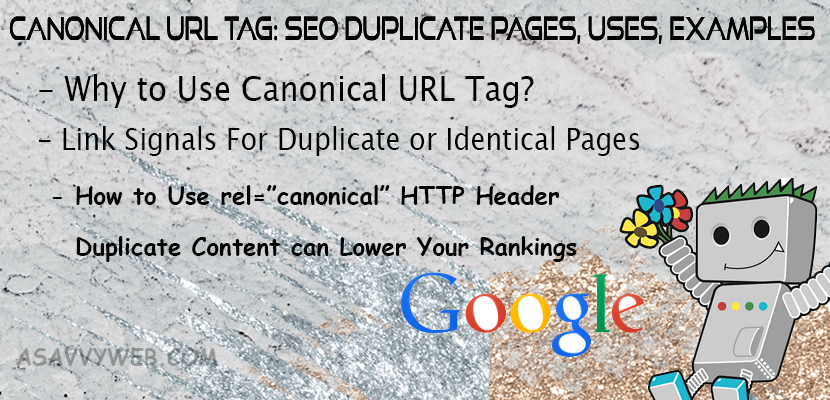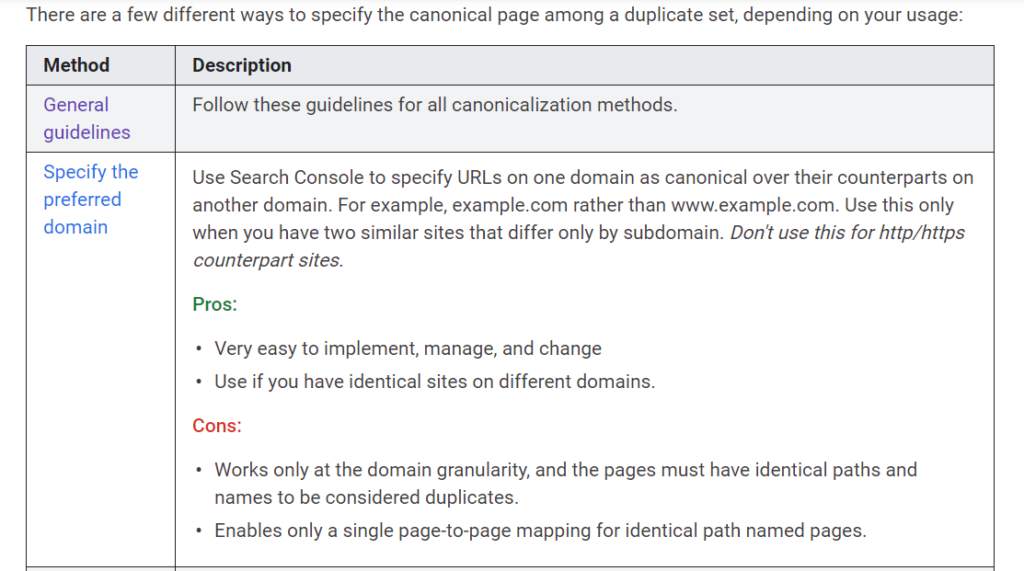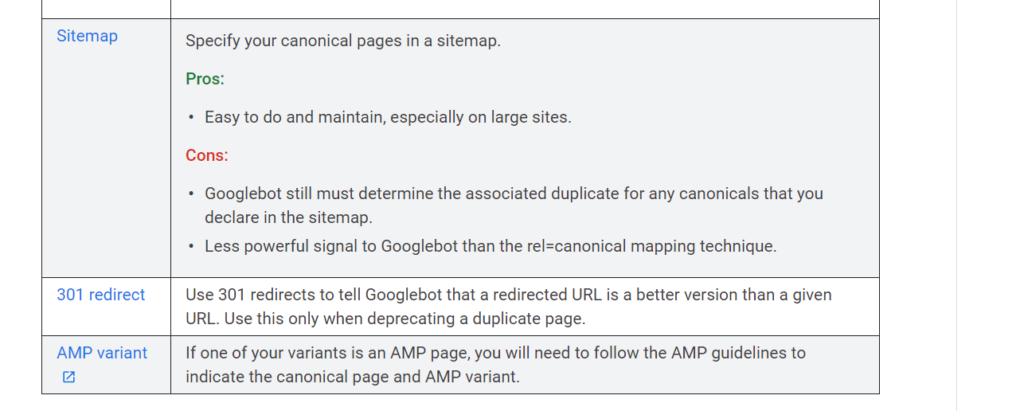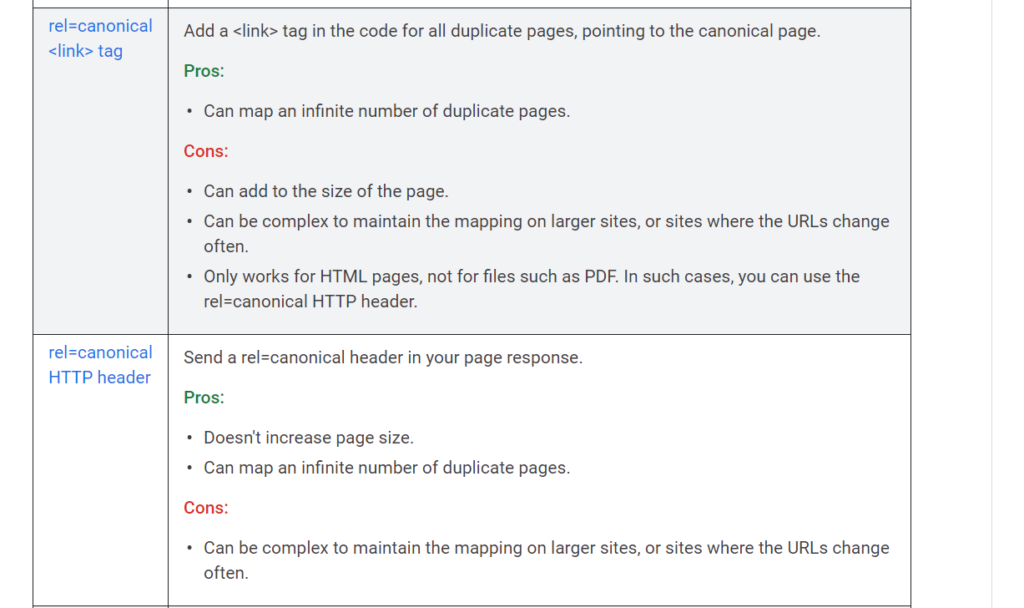- What is Canonical URL Tag or Rel= Canonical Tags:
- Why to Use Canonical URL Tag?
- How Canonical Tag Hurts SEO:
- Canonical URL Examples:
- Canonical URL Tag Syntax
- How to Add Canonical Tag in html:
- How to Use rel canonical HTTP Header
- Canonical Tag Checker
- Should Every page Have a Canonical Tag
- What are Canonical Tags in SEO
- Do Canonical Tag pass Link Juice
- Duplicate Page without Canonical Tag
- Canonical URL For WordPress
- Alternative Page with Proper Canonical Tag
- Best Practices for Canonical Tags
- Question Related to Canonical URL Tag in SEO Questions
- Do I Need a Canonical Tag:
- Should your Every Page have a Canonical Tag
- How do I use Canonical URL Tag in WordPress
What is Canonical URL Tag or Rel= Canonical Tags:
Canonical urls or the Rel canonical tags which deals with the duplicates of content.
Canonical tag that we use of web pages tells search engines where the original version of the page lives and its effectively pointing to the master copy of a page.
Modern web applications create a massive problems for us where we have lots of lots of different versions of the same thing.
A canonical tag on a webpage tells a search engine which version of the page that you want to rank, and so this is really vital for e commerce sites for any modern web application that has a sorting problem. Canonical tags are part of SEO & SEO is just one piece of digital marketing.
A canonical url is just telling google that we have a thousand of pages but really we have only one and that is the canonical url and it’s a very specific suggestion to search engines to say this is the master copy of url and asking google to index and rank in search results and ignore the rest.
Why to Use Canonical URL Tag?
There are number of reasons to choose clearly use canonical url tag in a set of similar or identical pages on your website.
Specify Which URL You Want to See in Search Results:
To tell search engines to choose which is the set of url to be displayed in Search results by using a canonical url tag and specify one url if your url is accessed by multiple urls then set a preferred canonical url which url should be seen in search results.
Consolidate Link Signals For Duplicate or Identical Pages
Search Engines are able to consolidate by using canonical tag and it benefits website and search engines to merge the information they have for the individual urls such as links to them into single and this means links from other sites will also be consolidates to one preferred url provided by canonical url tag.
Spending Crawling Time on Duplicate Pages
Everyone wants google bot to crawl important pages of your website not the duplicate pages and to get the most of your site its better to spend time crawling new pages or updated pages on site rather than crawling and indexing same pages twice.
Identify tracking metrics for Single Product or URL
With a variability and variety of URLs its very challenging to keep them tracking and get full picture on consolidate metrics for a specific piece of content.
Manage Syndicate Content
Specially for syndicate content for publication on other domains its important you want to consolidate metrics for a specific piece of content.
How Canonical Tag Hurts SEO:
A Couple of things on canonical urls and a good way to think about this
Duplicate content is bad will lead to the following Below issues:
Duplicate Content Hurts SEO and increase Crawl Budget.
Duplicate content can hurt your crawl budget so google and other search engines allocate a certain number of requests per day or per week or per month and if google and other search engine crawlers are spending all the time crawling garbage that you don’t want them to crawl that’s hurtful to website. That’s not good for you as a webmaster.
Duplicate Content can Lower Your Rankings
Duplicate content can lower your rankings, if google seeing a pattern of duplication on your site over and over again that can drop you in the rankings which affects organic traffic of your website and obviously that’s not good.
Duplicate Content can send users to low Quality Pages
Duplicate content can also send users to really low quality pages.
Lets Assume that you don’t care about crawl budget and duplicate content is hurting your rankings yet or you are not aware of it.
If users are finding your unnecessary pages in search results and that’s bad and that’s not good at all. These are all certain reasons why you want to solve the duplicate content problems because its not good for search engines, its not good for you and your rankings and its not good for your users either.
Canonical URL Examples:
Lets look at some examples here for duplicate content.
Iets say I have asavvyweb.com and we have page on our website called seo-guide and we want to rank on the google for term seo-guide.
URL will be asavvyweb.com/seo-guide this is the original version of the page and we would implement a canonical tag here with this link this is called a self referential canonical tag and the original copy of the page is pointing to itself and that’s fine, we can go ahead and do that, no problem at all and we are self-canonicalizing here, no issues at all and that’s totally fine and canonical tag is pointing to itself and this is a fine suggestion for google.
Now, look at the same page with a filter on it. So lets say we have and we want to sort this apge by everything that’s start with alphabetical order and we add a filter and may be a url parameter gets added to the url as with parameter ?= to the url, Now we have a new page that has a filter on it, but we don’t want that page in search results, so the canonical tag stays the same as “” and we have the page which exists for users but if google were to ever find it.
It sees that canonical tag in the head section and we are saying you are on the page but actually don’t index it, instead index the other one, the master copy and any links that this page gets, can you go ahead and pass over to the master copy and we don’t want to index this.
This could be an example where there isn’t any searcher intent for this particular type of phrase. We didn’t rank this page ranking and there wasn’t any search volume for it and so we are pointing it back to the master copy.
If the search volumes for seo guide and may be would leave this alone and self-canonicalize and may be we would want it in the search results.
But in this particular case lets say that for all intents and purpose of the example. We don’t want it in search results so we are going to add a canonical tag back to the master copy.
If you are not going to handle the canonical tag then its terrible and gets punished for that from google and even penalize if something goes wrong while handling canonicalization.
Canonical URL Tag Syntax
Below is the canonical tag Syntax:
For
url : example. com/category/seo
How to Add Canonical Tag in html:
You should add canonical tag in html in html in the header tag above the body tags where you add meta tags by the following code.
How to Use rel canonical HTTP Header
If you want to configure your website using rel canonical http header relatively than html tags to indicate the canonical url for non-html documents such as pdf files scuh as : Link: http://www.example. com/downloads/white-paper .pdf; rel= “canonical”.
Canonical Tag Checker
There are many canonical url tag checker which checks canonicalization perfectly and reduces lot of time if they are any miss match with canonical url tag.
Should Every page Have a Canonical Tag
Yes every page should have canonical tag as this indicates which version of your webpage should get indexed and ranked in google search results. If you are having same identical pages on your website then you should go with single canonical url tag pointing to one url and asking google to index only one version among the duplicate content serving with multiple pages.
What are Canonical Tags in SEO
Canonical tags in seo are very important which tells google bot or crawlers to index one version of webpage, which doesn’t make or stops your website from being getting duplicate.
Do Canonical Tag pass Link Juice
Yes! Canonical tags pass link juice as well. If one main master copy of url is getting lot of backlinks and the url is pointing to other urls the one version which is pointing as canonicals will pass the link juice and all the duplicate page links will be passed to the canonical page and solves the problem.
Duplicate Page without Canonical Tag
In New search console if you are seeing pages under duplicate page without canonical tag then first thing you need to do is disallow with robots.txt and stop google bot from crawling and pass the noindex directives for the pages of duplicate page without canonical tag which means google can access these url from different set of urls from your website and causing duplication of your website pages declared a pre-defined canonical tag as per the weightage of the page which is most important page for your website.
Canonical URL For WordPress
If you are on WordPress url then changing the canonical url for WordPress website is easy and to do this important and difficult task easily yoast provides an easy option in wordpress Yoast seo plugin for both post and pages in the yoast meta box section.
Alternative Page with Proper Canonical Tag
In new search console index status report in excluded pages table you can see “Alternative page with proper canonical tag”. Typically these pages are not indexed and what google thinks is its appropriate considering these pages are duplicates of other indexed pages and google recognized as the canonical of other page.
Best Practices for Canonical Tags
Canonical tags are important and if you implement it wrongly then it can make your website a complete mess which leads to manual action penalty straight away and there are few different ways to specify the canonical page amid duplicate set depending on the procedure or usage with regards to general guidelines and they are:
- General Guidelines
- Specify the preferred domain
- Rel=canonical Tag
- Rel=canonical Http Header Tag
- Sitemap
- 301 Redirect
- AMP variant
Question Related to Canonical URL Tag in SEO Questions
Is Canonical Tag Important
Yes! Canonical tag is important in SEO and this is the only way google bot recognizes the set of different pages and helps webmasters to prevent duplicate content issues.
Do I Need a Canonical Tag:
Yes, every web page is identical of other page and it can be recognized with canonical url tag and google differentiates them with canonical urls only and avoid content duplication.
Should your Every Page have a Canonical Tag
It depends up on your website whether your webpage should tell google bot that this page is important than the other page, then you need to use canonical tag to tell google bot with canonical tag and communicate with google.
How do I use Canonical URL Tag in WordPress
You can use Canonical url tag in wordpress by yoast plugin or several number of other plugin which can do the same work listed by wpbeginner.com.




